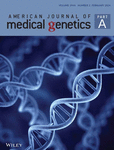Further evidence for an attenuated phenotype of in‐frame DMD deletions affecting the central rod domain of dystrophin around exon 48
Alterations in the X-linked recessive DMD gene cause dystrophinopathies with a broad clinical spectrum most commonly ranging from Duchenne muscular dystrophy (DMD) or Becker muscular dystrophy (BMD) to cardiomyopathy or intellectual disability.

Further evidence for an attenuated phenotype of in‐frame DMD deletions affecting the central rod domain of dystrophin around exon 48
Abstract
Alterations in the X-linked recessive DMD gene cause dystrophinopathies with a broad clinical spectrum most commonly ranging from Duchenne muscular dystrophy (DMD) or Becker muscular dystrophy (BMD) to cardiomyopathy or intellectual disability. Carrier females are commonly unaffected but may show signs of dystrophinopathies. In addition, few asymptomatic male carriers with elevated creatine kinase levels have been described possibly related to deletions around exon 48. We now further support this assumed genotype-phenotype correlation by reporting an attenuated phenotype in a three-generation family with a deletion of exon 48 of the DMD gene with clinically unaffected carrier males and females. We confirmed deep intronic breakpoints in this family by genome sequencing, but such data are not available for published cases. Therefore, further observations are needed to clarify genotype-phenotype correlation in this region, since few reports also describe predicted in-frame copy number changes affecting this region in association with classical signs of dystrophinopathies.
Keywords:
- dystrophinopathy
- exon 48
- deletion genotype-phenotype correlation
- hypomorphic variant
Read the full publication here:
Further evidence for an attenuated phenotype of in‐frame DMD deletions affecting the central rod domain of dystrophin around exon 48
PMID:39158144, DOI: 10.1002/ajmg.a.63842, S2CID: 71896500, American Journal of Human Genetics, Part A, (e63842):1-6. 2024, Aug. 19. Epub ahead of print.
Authors:
Olga Bürger, Angelika Humbel, Ivan Ivanovski, Alessandra Baumer, Anita Rauch